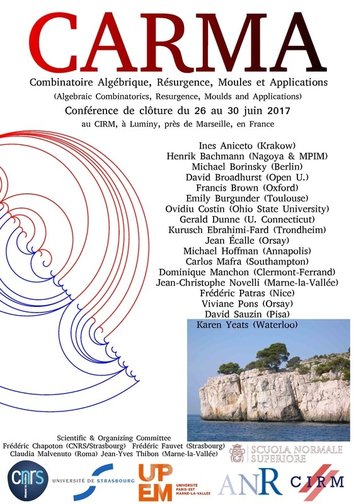CARMA
(Algebraic Combinatorics, Resurgence, Moulds and Applications)
June 26 – 30, 2017
|
The CARMA project of the French National Research Agency is devoted to Algebraic Combinatorics, Resurgence, Moulds and Applications. It was started in 2012. The conference CARMA 2017 is aimed as being an important event among the ones organized within this project, to take stock of the numerous recent achievements and publications on these topics, from people both outside and inside this research group.
The conference will notably emphasize the role of Hopf algebraic techniques and related objets (e.g. Rota–Baxter algebras, operads, Ecalle’s mould calculus), which have lately proved pervasive in combinatorics, but also in many other fields, from multiple zeta values to the algebraic study of control systems and the theory of rough paths. Beside those, the last 4 years have seen a burst of articles in various parts of theoretical physics that enhance the role of resurgent functions, beyond their original applications in dynamical systems and these will also be among the topics of the conference. It is a good moment for an extended dissemination of the combinatorial constructions developed within the CARMA project, in connection with Ecalle’s powerful theories, and it is also time to pave the way for a better understanding of some crucial questions being currently studied in many domains of Mathematics or Physics which involve the very same type of objects, and where activity is intense. This workshop will thus be a timely opportunity for scientists belonging to distinct communities, though sharing similar techniques, to report on their latest results and exchange ideas. The selection of talks will focus on algebraic combinatorics and moulds, with a component on alien differential calculus and resurgence in Physics. A volume of Proceedings will follow. |
Scientific & Organizing Committee
Frédéric Chapoton (CNRS et Université de Strasbourg) |
Ines Aniceto (Jagiellonian University) Beyond asymptotics in gauge and string theories
Henrik Bachmann (University of Nagoya) A simultaneous q-analogue of finite and symmetrized multiple zeta values
Michael Borinsky (Humboldt University Berlin) Flag decompositions of graphs and their Hopf algebraic structure
David Broadhurst (Open University) Explosive combinatorics from Feynman integrals
Emily Burgunder (Université de Toulouse 3) Generalised algebras and freeness
Ovidiu Costin (Ohio State University) From divergence to convergence (pdf)
Gerald Dunne (University of Connecticut) Quantum Geometry and Resurgent Perturbative/Non-perturbative Relations
Kurusch Ebrahimi-Fard ( NTU Trondheim) Monotone, free, and boolean cumulants from a shuffle algebra viewpoint
Jean Ecalle (Université Paris-Sud) Taming the coloured multizetas
Michael E. Hoffman (United States Naval Academy) Quasi-shuffle algebras (pdf)
Carlos Mafra (University of Southampton) Superstring scattering amplitudes and combinatorics
Dominique Manchon (Université Clermont-Auvergne) Free post-Lie algebras, the Hopf algebra of Lie group integrators and planar arborification
Jean-Christophe Novelli (Université Paris-Est Marne-la-Vallée) Hopf Algebras on m-permutations and (m + 1)-ary trees
Frédéric Patras (Université de Nice Sophia-Antipolis) Pictures !
Sylvie Paycha (Postdam University) Branched zeta functions and a refined universal property for trees
Viviane Pons (Université Paris-Sud) Lattice and Hopf algebra of integer relations
David Sauzin (UMI Fibonacci, Pisa) Analytic linearization of multi-dimensional dynamical systems through tree-expansions
Karen Yeats (University of Waterloo) Connected chord diagrams, bridgeless maps, and perturbative quantum field theory


